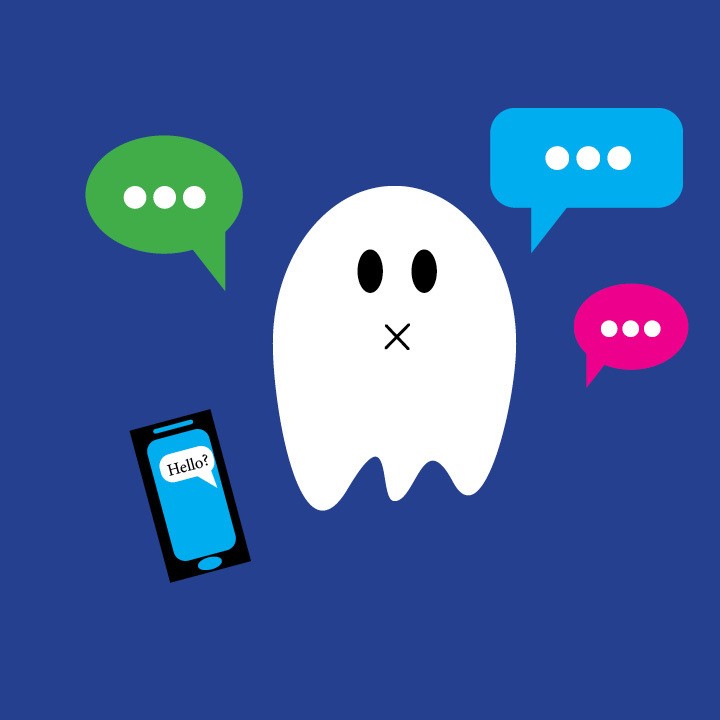Deep conversations become one word answers, the time between responses goes from minutes to days and, before you know it, it has been a week since you last spoke. There is now no more contact. This is called “ghosting.”
Ghosting, or suddenly disappearing and cutting off contact all together, has become more common in the social world today. The Merriam-Webster dictionary defines the term as, “the act or practice of abruptly cutting off all contact with someone (such as a former romantic partner) by no longer accepting or responding to phone calls, instant messages, etc.”
The term was added to the Merriam-Webster dictionary in February 2017, and the act of ghosting can be traced back to 2006. During this time, the most popular form of communication was through IM and there was the option to set your IM status to “invisible,” making it easy to disappear.
Many of us have experienced ghosting first hand or know someone who has been ghosted. It is becoming more common in today’s society since many of our conversations are done virtually through texting and social media.
In the introduction to a study on ghosting published in the International Journal of Environmental Research and Public Health, the authors said that 13% to 23% of adults in the United States have been victims of ghosting, citing a poll from data group YouGov and a study published in the Journal of Social and Personal Relationships. As more and more people continue to mainly connect with others virtually, the percentage of people who experience this will most likely continue to rise.
RELATED: OPINION: If you compare yourself to “that girl” on TikTok, you are not alone
For many people, ghosting happens in the dating world, either over text, snapchat, dating apps or similar forms of communication. People see it as an “easy escape” or way out of a situation they no longer want to be in. They would rather disappear and cut off conversation altogether than communicate and explain where they are coming from. Individuals simply disappear, delete the contact and never see or speak to someone again without stopping to think about the effect it may have on the person who is on the other side of the situation.
It’s no secret that communication can be tough, which is why many people choose this as their escape route. Ghosting can be a common occurrence when someone doesn’t want to have a tough conversation and be honest with another individual.
“Honesty is the best policy,” but in today’s society many individuals would rather disappear than have a conversation to share their thoughts and feelings. Others choose to ghost due to the fact that they are not sure how to communicate or express their feelings, are avoiding conflict or because they are afraid of hurting someone by starting a difficult conversation.
Some individuals ghost because they feel as if it’s less harmful than outright rejecting someone. However, a survey done by Hinge showed that 85% of people would rather receive rejection than silence. When someone experiences ghosting, they are left in the dark feeling as if they were abandoned. Initially, they are left wondering, “What’s going on? What did I do wrong?” An automatic response they have for the situation is to put the blame on themselves.
RELATED: Why Twitch streaming is so addictive
This form of social rejection takes a toll on our self esteem, mood, thoughts and feelings. Humans are social beings, and many of us want to be wanted and liked by others. A lot of us have experienced rejection in one form or another, and we most likely can all agree on the fact that it hurts. We need time to heal from the emotional pain we are left with, just like we need time to heal from experiences that cause physical pain.
An article from Psychology Today explained how our brains respond to physical and emotional pain in a similar way. The part of our brain that is activated when we process physical pain is also activated when we experience emotional pain, such as rejection. This is why rejection and hurt feelings can deeply affect us. Emotional pain also sticks with us longer than physical pain because our minds will continue to replay and relive the experiences that we have gone through as time passes on.
Communication is key and having good communication is necessary in all friendships and relationships. It’s important to remember that there are some situations that you need to face; you can’t always hide behind a phone screen, deleting messages and ignoring contacts. Leaving another person in the dark wondering what has happened is selfish and hurtful.
Follow Julianna on Twitter

Julianna is a senior majoring in journalism and sociology. She enjoys writing and reporting on topics related to mental and physical health and wellness.









